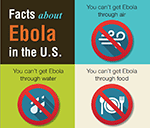Ebola is a severe, often fatal, viral hemorrhagic fever disease. Even though a few cases of Ebola have recently been diagnosed in the U.S., Ebola poses very low risk to the U.S. population. Ebola was first discovered in 1976 in Africa, near the Ebola River in the Democratic Republic of the Congo.
Currently, there is a large Ebola outbreak in three West African countries: Guinea, Liberia and Sierra Leone.
You cannot get Ebola from a person who is not sick or not showing symptoms.
The Greene County Public Health Department is working closely with local first responders and health care providers to provide guidance, information and tracking of potential cases. Greene County is prepared in the event of an Ebola case identified and Greene County Public Health Department will continue to provide guidance and support for the first responders and health care providers who would be on the ground to deal with any potential cases.
Symptoms may appear anywhere from 2 to 21 days after exposure to the disease, but the average is 8 to 10 days. Symptoms of Ebola include:
If you returned from your travel less than 21 days ago and are not sick, you should take your temperature two times a day to check for signs of a fever (temperature greater than 101.5°F or 38.6°C). If you get a fever within 21 days of travel in countries affected by Ebola, you should call 911.

Ebola is transmitted through direct contact with the blood or bodily fluids of an infected symptomatic person or through exposure to objects (such as needles) that have been contaminated with infected secretions. Ebola is not a respiratory disease like the flu, so it is not transmitted through the air. Ebola also cannot be transmitted through water or food (in the U.S.).
The severity of the disease varies, but over 50% of patients with Ebola have died during past outbreaks. However, early access to appropriate medical care has been shown to be a key factor in recovering from this disease.
There is no approved medication for Ebola. Treatment focuses on supportive care and may require intensive care unit support. Experimental vaccines and treatments are in development but have not been fully tested for safety or effectiveness in people.
No. Use normal cleaning products, and always take proper precautions when cleaning any body fluids (such as blood or vomit). If a confirmed case of Ebola results in body fluid contamination outside of a health care facility, the Health Department will assess the site and will arrange for safe clean up by a professional contractor.
At this time, there have been no reports of dogs or cats becoming sick with Ebola or of being able to spread Ebola to people or animals. The chances of a dog or cat being exposed to Ebola virus in the United States is very low as they would have to come into contact with blood and body fluids of a symptomatic person sick with Ebola.
New York State has launched a new State information line to answer questions from New Yorkers on Ebola. The info line is free and trained staff will be answering the public’s questions 24 hours a day/7 days a week. The info line number is 1-800-861-2280.
NYS Department of Health: https://www.health.ny.gov/diseases/communicable/ebola/#public
Centers for Disease Control and Prevention: https://www.cdc.gov/vhf/ebola/index.html
For additional Greene County Public Health updates, follow us on Facebook and Twitter.
Last updated: 11/06/2014